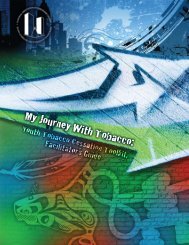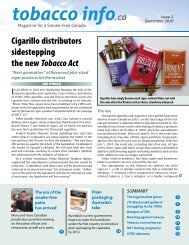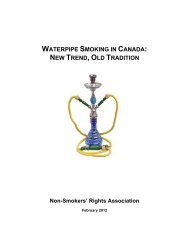Tobacco-Free Sports and Recreation Policies
Tobacco-Free Sports and Recreation Policies - New Brunswick Anti ...
Tobacco-Free Sports and Recreation Policies - New Brunswick Anti ...
Create successful ePaper yourself
Turn your PDF publications into a flip-book with our unique Google optimized e-Paper software.
<strong>Tobacco</strong>-<strong>Free</strong> <strong>Sports</strong> <strong>and</strong> <strong>Recreation</strong> <strong>Policies</strong><br />
Findings<br />
Rationale for TFSR Policy Development<br />
This Case Study team developed a TFSR policy for a range of reasons. Two PHU informants<br />
described how this TFSR policy stemmed from a TCAN initiative that was primarily interested in<br />
smoke-free outdoor spaces, but staff felt that the appetite for such by-laws was not very strong<br />
in the community. The focus on youth <strong>and</strong> tobacco-free sport <strong>and</strong> recreation activities within a<br />
key major sporting team in the community was considered a launching point for outdoor by-law<br />
development.<br />
We [PHU] just did a, a large kind of campaign with them [team name]<strong>and</strong> part of my<br />
job was to kind of support that <strong>and</strong> really kind of take it to other kind of areas so<br />
we used the [team name] as kind of a, you know like a, a champion of the<br />
community <strong>and</strong>, <strong>and</strong> with the youth that I was working with at the time [Youth<br />
Action Alliance: YAA] we really kind of took you know here look at these older guys<br />
<strong>and</strong> we kind of brought them to kind of the younger hockey teams to do some role<br />
modeling <strong>and</strong>, to help discussion <strong>and</strong>, really used it as a tool to further you know<br />
some work on public policy in terms of our smoke-free outdoor spaces bylaw. (PHU<br />
Key Informant)<br />
Players shared a wide range of reasons why the team adopted a TFSR policy that included the<br />
hockey organization’s interests in maintaining healthy players <strong>and</strong> being solid role models for<br />
children <strong>and</strong> youth in the community:<br />
[TFSR policy] keeps our team clean <strong>and</strong> able to focus on hockey. (Player)<br />
P1: Also for that like it doesn’t lead on to other things <strong>and</strong> then like the team does<br />
it outside of the rink <strong>and</strong> then people start finding out <strong>and</strong> then the team gets a<br />
bad rep.<br />
P2: I feel like they put it in place cause they want to like eliminate it like entirely so<br />
if the policy is there <strong>and</strong> then if they want to like get rid of it entirely.<br />
P3: Like he was saying it also it’s a representation on not just yourself but the<br />
organization as well <strong>and</strong> the community. If you’re going to away games <strong>and</strong> you<br />
know like you’re outside at an away game <strong>and</strong> you know everybody’s smoking a<br />
cigarette after or before the game it, it reflects poorly on the coaching staff <strong>and</strong> like<br />
the [Team name] in general <strong>and</strong> I know a lot of teams they want to keep their<br />
organizations as one of the highest organizations possible in the league so in any<br />
league that you’re in.<br />
Ontario <strong>Tobacco</strong> Research Unit 41





